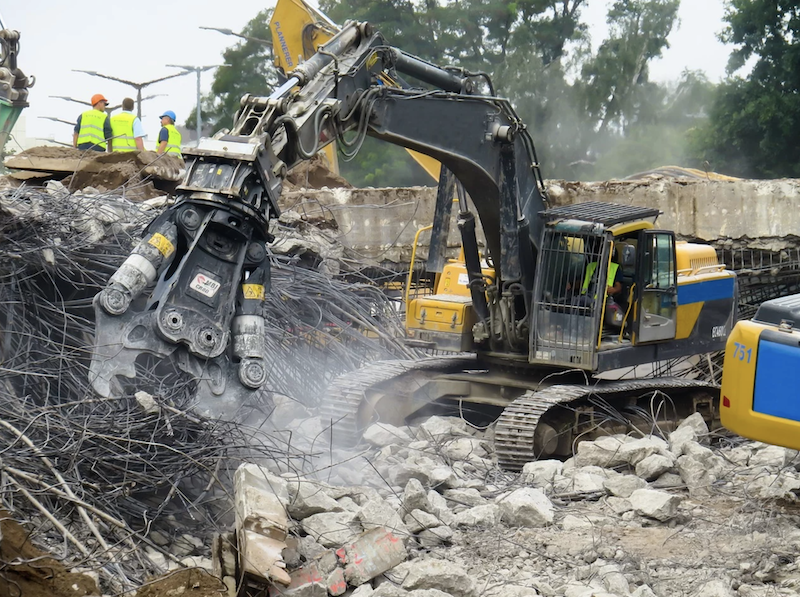Embodied carbon in buildings accounts for 11% of all global greenhouse gas emissions, according to The Urban Land Institute’s (ULI) Greenprint Center for Building Performance.
A new report from that group, Embodied Carbon in Buildings Materials for Real Estate, explains how reducing embodied carbon in the construction process can save developers money and help mitigate the impacts of climate change. Embodied carbon refers to the emissions associated with the manufacturing, transportation, construction of building materials, as well as building materials disposal.
Greenprint and its members are striving to reduce greenhouse gas emissions by 50% by 2030. The report examines multiple steps that contractors and developers can take to reduce their embodied carbon:
· Consider low-carbon structural materials, such as green concrete, recycled steel, or mass timber
· Reduce the total materials in building design, which can result in lower costs
· Repurpose used materials as much as possible, which can add authenticity to a project
· Specify lower-carbon materials when offering an RFP, which often comes at no added cost
· Calculate the embodied carbon of the materials in the project, to understand the emissions impacts and prepare the building for eventual embodied carbon reporting regulations that may be enacted by local municipalities
· Promote the embodied carbon reductions gain to build community good will and increase market awareness and adoption of reduced embodied carbon buildings
Related Stories
Legislation | Mar 28, 2022
LEED Platinum office tower faces millions in fines due to New York’s Local Law 97
One Bryant Park, also known as the Bank of America Tower, in Manhattan faces an estimated $2.4 million in annual fines when New York City’s York’s Local Law 97 goes into effect.
Codes and Standards | Mar 24, 2022
New York senate moves to speed up fossil fuel ban in new buildings
Lawmakers in the New York State Senate are backing a proposal to ban fossil fuels in new building construction three years sooner than a plan proposed by Gov. Kathy Hochul.
Codes and Standards | Mar 23, 2022
High office vacancies have cities rethinking downtown zoning
As record-high office vacancies persist in U.S. urban areas, cities are rethinking zoning policy.
Codes and Standards | Mar 22, 2022
Dept. of Energy awards $32 million for next-generation building retrofits
The U.S. Dept. of Energy has awarded a total of $32 million for more than 30 next-generation building retrofit projects that will dramatically improve affordable housing technologies, according to a DOE news release.
Legislation | Mar 18, 2022
New framework to help site community solar projects released
The Solar Energy Industries Association (SEIA) released a new report to aid policymakers in siting community solar projects.
Codes and Standards | Mar 17, 2022
Dept. of Energy seeks input on building-integrated photovoltaic systems
The U.S. Department of Energy (DOE) Solar Energy Technologies Office (SETO) and Building Technologies Office (BTO) recently issued a request for information to gather input on technical and commercial challenges and opportunities for building-integrated photovoltaic (BIPV) systems.
Legislation | Mar 16, 2022
Weak federal commercial real estate rules will hamper seizing Russian assets
Lax disclosure regulations that have made the U.S. a global hot spot for money laundering via real estate holdings will make it difficult for officials to seize properties from Russian oligarchs.
Codes and Standards | Mar 15, 2022
First company awarded Fitwel Certification in Senior Housing for Occupant Health & Wellness
The Springs at Greer Gardens in Eugene, Ore., is the first property to earn a Fitwel global health certification under the newly created senior housing scorecard.
Codes and Standards | Mar 10, 2022
HOK offers guidance for reducing operational and embodied carbon in labs
Global design firm HOK has released research providing lab owners and developers guidance for reducing operational and embodied carbon to meet net zero goals.
Codes and Standards | Mar 7, 2022
Late payments in the construction industry rose in 2021
Last year was a tough one for contractors when it comes to getting paid on time.

















